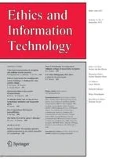Abstract
The present study examines certain challenges that KDD (Knowledge Discovery in Databases) in general and data mining in particular pose for normative privacy and public policy. In an earlier work (see Tavani, 1999), I argued that certain applications of data-mining technology involving the manipulation of personal data raise special privacy concerns. Whereas the main purpose of the earlier essay was to show what those specific privacy concerns are and to describe how exactly those concerns have been introduced by the use of certain KDD and data-mining techniques, the present study questions whether the use of those techniques necessarily violates the privacy of individuals. This question is considered vis-à-vis a recent theory of privacy advanced by James Moor (1997). The implications of that privacy theory for a data-mining policy are also considered.
Similar content being viewed by others
References
A. Allen. Uneasy Access: Privacy for Women in a Free Society. Rowman and Littlefield, Totowa, NJ, 1988.
J-F. Blanchette and D. G. Johnson. Cryptography, Data Retention, and the Panopticon Society: The Social Benefits of Forgetfulness. In L. D. Introna, editor, Proceedings of the Conference on Computer Ethics: Philosophical Enquiry '98, pp. 94–105. University of London Press, London, UK, 1998.
W. Brennan. Eisenstandt v. Baird (U.S. Supreme Court Decision), 1972.
A. Cavoukian. Data Mining: Staking a Claim on Your Privacy. Information and Privacy Commissioner's Report, Ontario, Canada.
J. W. DeCew. In Pursuit of Privacy: Law, Ethics and the Rise of Technology. Cornell University Press, Ithaca, New York, 1997.
U. Fayyad, G. Piatetsky-Shapiro and P. Smyth. The KDD Process for Extracting Useful Knowledge From Volumes of Data. Communications of the ACM, 39(11): 27–34, 1996.
C. Fried, Privacy: A Rational Context. Chap. IX in Anatomy of Values. Cambridge University Press, New York, 1970. Reprinted in M.D. Ermann, M.B. Williams and C. Gutierrez, editors, Computers, Ethics, and Society, pp. 51–63. Oxford University Press, New York, 1990.
J. S. Fulda. From Data to Knowledge: Implications of Data Mining. Computers of Society, 27(4): 28, 1997.
R. Gavison. Privacy and the Limits of the Law, Yale Law Journal, 89, 1980. Reprinted in D. G. Johnson and H. Nissenbaum, editors, Computers, Ethics & Social Values, pp. 332–351. Prentice Hall, Englewood Cliffs, NJ, 1995.
D. G. Johnson. Computer Ethics. 2nd ed. Prentice Hall, Englewood Cliffs, NJ, 1994.
J. H. Moor. The Ethics of Privacy Protection, Library Trends, 39 (1 & 2): 69–82, 1990.
J. H. Moor et al. Privacy, Professional Ethics, 3 (3 & 4): 3–25, 1994.
J. H. Moor. Towards a Theory of Privacy in the Information Age. Computers and Society, 27(3): 27–32, 1997.
H. Nissenbaum. Can We Protect Privacy in Public? In M. J. van den Hoven, editor. Proceedings of the Conference on Computer Ethics: Philosophical Enquiry '97 pp. 191–204. Erasmus University Press Rotterdam, The Netherlands, 1998.
J. Rachels. Why is Privacy Important? Philosophy and Public Affairs, 12(4). Reprinted in D. G. Johnson and H. Nissenbaum, editors. Computers, Ethics & Social Values, pp. 351–257. Prentice Hall, Englewood Cliffs, NJ, 1995.
P. Regan. Legislating Privacy: Technology, Social Values, and Public Policy. University of North Carolina Press, Chapel Hill NC, 1995.
H. T. Tavani. Internet Search Engines and Personal Privacy. In M. J. van den Hoven, editor, Proceedings of the Conference of Computer Ethics: Philosophical Enquiry '97, pp. 214–223. Erasmus University Press, Rotterdam, The Netherlands, 1998.
H. T. Tavani. Informational Privacy, Data Mining, and the Internet. Ethics and Information Technology, 1(2), 1999.
H. T. Tavani (in press). Privacy and Security, Chap. 4 In D. Langford, editor, Internet Ethics. Macmillan Press, London, UK.
A. H. Vedder, E. Schreuders and R. Van Kralingen. Knowledge Discovery in Databases and De-individualization. In L. D. Introna, editor, Proceedings of the Conference on Computer Ethics: Philosophical Enquiry '98, pp. 121–125. University of London Press, London, UK, 1998.
S. Warren and L. Brandeis. The Right to Privacy. Harvard Law Review, 14(5), 1890.
A. F. Westin. Privacy and Freedom. Anatheum Press, New York, 1967.
Author information
Authors and Affiliations
Rights and permissions
About this article
Cite this article
Tavani, H.T. KDD, data mining, and the challenge for normative privacy. Ethics and Information Technology 1, 265–273 (1999). https://doi.org/10.1023/A:1010051717305
Issue Date:
DOI: https://doi.org/10.1023/A:1010051717305




